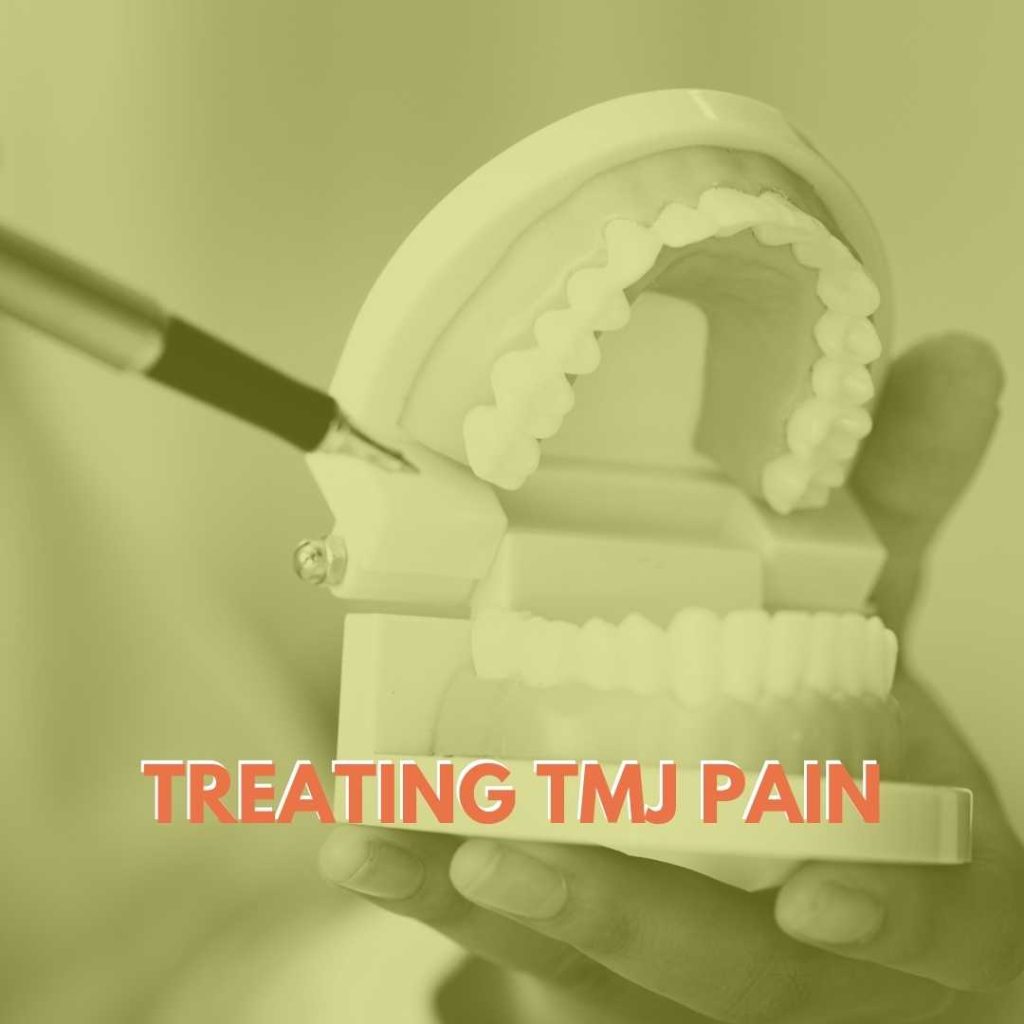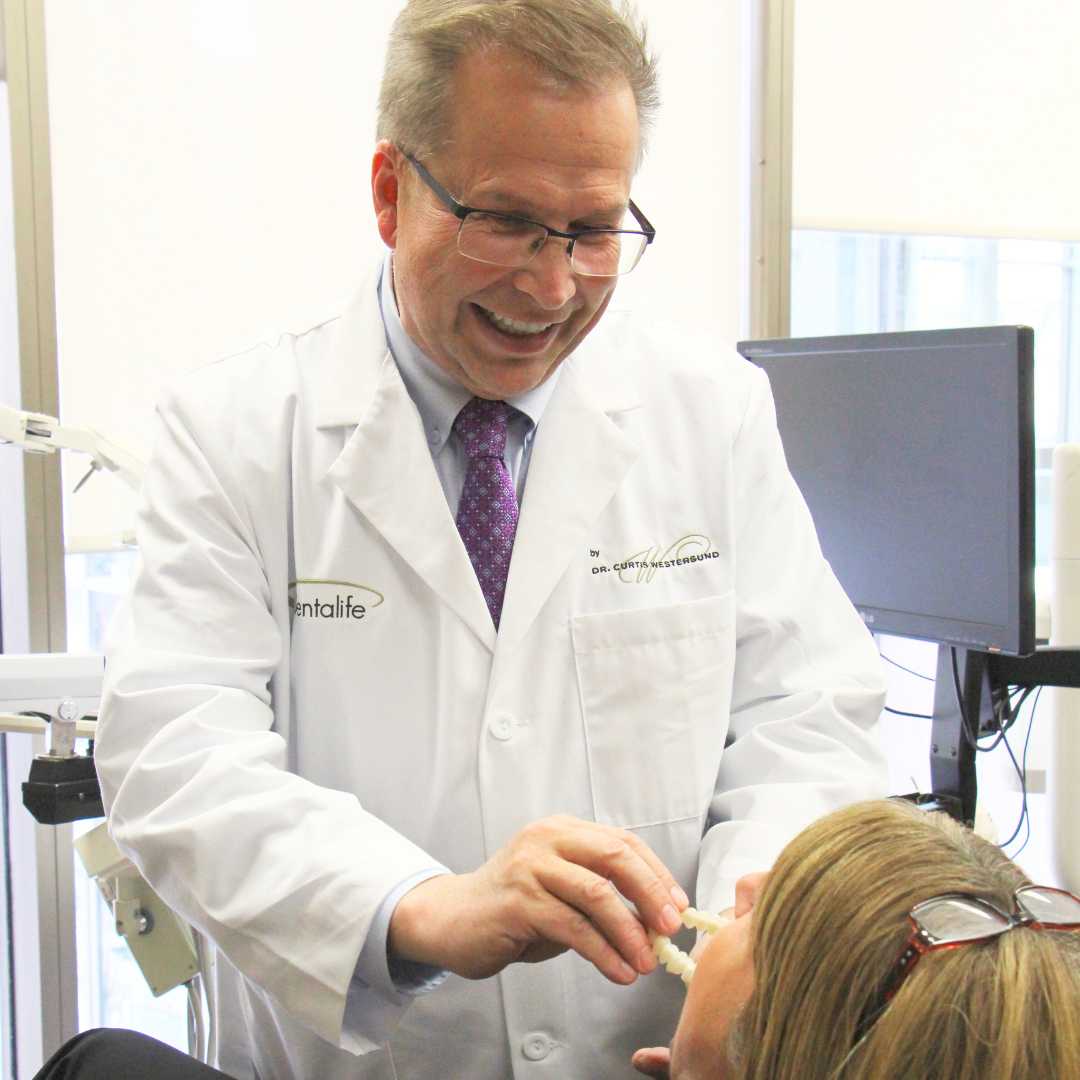How do you know if the pain you feel is caused by your TMJ? You may have pain in your neck or back. You may feel tightness in the muscles around your jaw or temple. You may experience tension headaches, ringing in your ears, vertigo, or earaches. You may have trouble swallowing. You may experience IBS. You may have leg or foot pain. You may wake up with pain or have pain happen during the course of the day.
Many types of pain are not just medical in origin. Causes of TMJ pain are sneaky and often have symptoms that occur far away from their origin. Remember, pain, or a loss of functional mobility are not the same for everyone. While some pain sufferers search for a way to manage the pain they feel, others will look for a solution to eliminate or reduce the onset of the pain they feel.
So if you think you’re experiencing one of the many symptoms of TMJ Disorder, or your medical professionals cannot find a medical cause, it’s important to see a TMJ practitioner (that could be a dentist) right away. He or she can assess the condition and find the best options for treating TMJ available.
What is TMJ?
Dr. Curtis Westersund:
“The abbreviation TMJ (in doctor jargon: TMD) stands for Temporomandibular Joint Disorder. What is TMJ? The slightest imbalance in the way your teeth bite and function (also known as occlusion) can result in inflammation or disturbance of the TMJ Joints (located just above your jaw joints underneath your ears) which can cause a list of TMJ pain symptoms.
A misaligned bite or a misaligned jaw position can also contribute to poor body posture, decreased strength or limited flexibility, and even cause a compromised breathing airway that may result in sleep disturbance issues.
Seemingly innocent signs (like worn teeth or snoring), can indicate the presence of major misalignments and trigger multiple pain symptoms. Pain symptoms that can disrupt your daily functioning, work, relationships, and even your entire life.
You might have Googled: “What is TMJ?” because you experience TMJ pain symptoms right now. Unfortunately, “Dr. Google” may just add to your confusion. Answers to TMJ problems and solutions come with many controversies online. The take home advice I have is to seek guidance as soon as possible. TMJ pain is a signal that something major may be happening and ignoring signals your body gives you usually results in more pain and discomfort. Waiting won’t help. Waiting only makes things worse.”
Below an overview of the most common TMJ Pain Symptoms:
- Difficulty chewing or pain while chewing
- Difficulty opening the mouth
- Locking of the jaw joints
- Clicking and popping of jaw joints
- Severe headaches
- Heavy migraines
- Dizziness (Vertigo)
- Nausea
- Pain or tenderness of your jaw.
- Sensitive teeth
- Severe neck pain
- Shoulder pain
- Ear pain
- Tinnitus or ringing in the ears
- Facial pain
- Sinus like pain
- Pain above or behind the eyes
- Pain at the base of the skull
- Difficulty swallowing food
- Irritated bowel syndrome
- Anxiety
- Hip imbalance
- Ankle pain
- Generalized Inflammation
- Sleep Disturbance issues including unrestful sleep, morning jaw or headache pain, and snoring
All could have an origin with a misaligned neck, head, jaw, and/or bite. (The way your teeth mesh together affects the function of your whole body.) When any of the symptoms above are affecting you right now, we recommend to seek professional medical or dental help as soon as possible.
At Dentalife, Dr. Curtis Westersund has many years of experience with treating TMJ Pain Symptoms. Make an appointment today.
Causes of TMJ Pain
Do I have TMJ? In order to give you the relief you need and deserve, we strive to provide accurate information. We’d like to end the confusion of what is causing your TMJ pain. Taking away any confusion is key to making a plan to get rid of it.
Multiple factors must be considered when assessing a TMJ diagnosis, such as causes, symptoms, the location and type of pain, and the response to your pain. When having a TMJ Disorder , it can be difficult to determine what exactly is wrong, where it comes from, or even what to do about it. It requires science, technology, and experience to define what can be done and how. Dr. Curtis Westersund at Dentalife can help.
Dr. Westersund:
“When one, or both of your TMJ joints are hurting, it could be caused by the following issues.”
- Injuries
- Tooth Decay
- Gum Infection
- Autoimmune Diseases
- Structural strain
- Stress
- Teeth Grinding
- Dental Procedures
- Medical Procedures (Surgery)
- Repetitive Action
- Bad Posture
- Genetics and epi-genetics
While TMJ pain can be connected to something from your past health history, such as a car accident, a fall, an upper body injury, a facial injury or past dental work like an extracted tooth that was never replaced, TMJ problems can have a very simple start from how a person grew. An imbalance within a patient’s own body has the ability to over time create strains to their teeth and jaws, thus changing the way a person’s face grows. The consequence is often crowded teeth and small dental arches. Something as simple as like grinding the teeth at night, abnormal chipping and wearing of teeth, or functional limitations in the body can have an origin in how we grew.
The genetics that you were born with can also play a part in TMJ pain… how each person reacts to their environment can change how tissue grows in the body. Genetics also tells us how the body will respond to pain, and even cause a change in a person’s growth. Those factors may seem small and insignificant at first. But insignificant things accumulate and become big problems for many TMJ pain sufferers.
Our goal is to provide strain reduction in the entire body in a coordinated protocol.”
How does Treating TMJ Work?
It is all about balance. When a dentist can help provide balance to your body structure, many TMJ signs and symptoms go away. It is utmost important to re-align your bite to ensure your body stays in balance. Changing your bite impacts your entire body. There are many technologies now available to dentists to help improve overall function to the teeth and jaws. Teeth can be sculpted and balanced precisely, helping reduce structural strain and speed up the treatment of TMJ therapy.
During a thorough consultation, we will discuss possible options to treat your TMJ Disorder (TMJD). We may take a Cone Beam CAT Scan of your jaws, jaw joints, airway and neck to assist in any diagnosis or treatment options. We may look at how your teeth have affected your overall posture. We may look at the way your teeth bite and function to see imbalances.
1. Diagnostic Testing
An appointment to assess jaw and neck muscle activity, jaw movement, and joint function. Along with physiotherapy provided by Ultra Low Frequency T.E.N.S. a more healthy bite starting position can be determined.
2. A digitally guided rebalancing of the teeth
1 or 2 appointments to improve the balance of your bite using a digital occlusion analysis system (called the T-scan) and micro-adjustments to begin to eliminate bite strain in clenching and chewing.
3. A dental orthotic or appliance
A removable lower dental orthotic that will help balance your jaw and bite.
4. A Sleep disturbance assessment
An assessment and possible home testing for sleep related disturbances
5. Follow Up care
As your jaw structure begins to heal and improve its function and balance, and as your posture improves, adjustments to your bite and/or your orthotic will be required to continue to provide balanced support. This may be as short as 6 months or as long as 2 years. It all depends on you.
Who provides TMJ Pain care and treatment in Calgary, Alberta?
There are many TMJ practitioners active in Calgary, Alberta. One of these is Calgary general dentist Dr. Curtis Westersund:
“It is important to know that with the seemingly endless variables of TMJ causes, symptoms, and personal medical issues, there is nothing like a ‘One size fits all’ approach to TMJ treatment. As with all medical treatments, there is never a guarantee that any TMJ treatment will work the same for everyone. What is important is that any TMJ care focuses on you as a person. Dentistry is always learning more and more on effective TMJ treatments. Seek help from one of the many dentists in Alberta. Remember that not all pain problems are medical in origin. Let’s find out what can work for you.”




